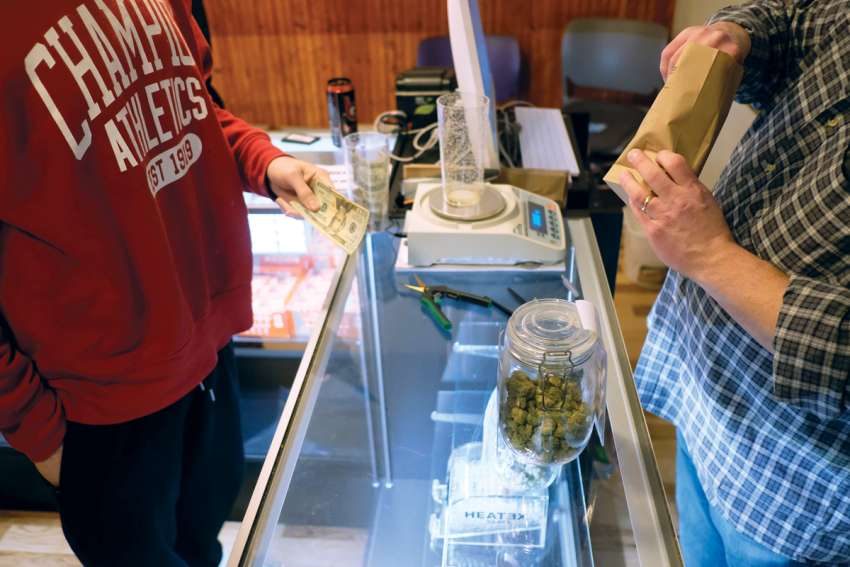The Cannabis Act “introduces a suite of public health and public safety controls aimed at providing Canadians with evidence-based information to support informed decision-making” while protecting children and youth from “harms associated with cannabis use,” says the federal government.
But apparently one group of Canadians didn’t get the memo.
The number of adults aged 65 plus checking into Ontario Emergency Rooms (ER)s with cannabis poisoning tripled over eight years of cannabis legalization, says a study published May 20.
The study period was divided into three phases: pre-legalization from January 2015 to October 2018; the legal sale of dried cannabis from October 2018 to January 2020; and the availably of edibles, from January 2020 until the study wrapped up at the end of December 2022.
Rates of cannabis poisoning in ER visits were 5.8 cases per 100,000 in the first phase, 15.4 per 100,000 in the second phase, and 21.1 per 100,000 cases once edibles were introduced. The researchers say the rates are probably much higher, since the study only tracks ER visits.
Geriatric specialist and lead author Dr. Nathan Stall told The Canadian Press: “These are people very sick to the point where health-care practitioners, without knowing that they've consumed cannabis, consider other serious health conditions, like stroke, serious infection (and) serious metabolic abnormalities."
In one case, the medical team discovered that a gravely ill patient in his 80s ate a family member’s cannabis product thinking it was a snack.
Interestingly, the Canadian government admits cannabis use “can be riskier for adults over 55” with more intense impacts like hallucinations, loss of coordination, paranoia, dizziness, and blurred vision. In its “evidence-based information,” the government gives step-by-step instructions on how older adults can more safely consume cannabis.
Regarding safety for children and underage youth, the Act promised to “protect the health of youth” primarily by prohibiting them from purchasing the drug.
But having cannabis in the form of edible gummies, jellybeans, cookies, and other treats around the house does, in fact, increase children and youth’s access to cannabis.
A 2022 paper in the New England of Medicine studied children ages zero to nine hospitalized for accidental cannabis poisonings in Alberta, British Columbia, Ontario and Quebec from 2015 to 2021. The study was divided into three periods identical to the older adult research.
Hospitalization rates in Alberta, British Columbia and Ontario during the time immediately after legalization were 2.6 times as high as those before legalization. Following the introduction of edibles, the hospitalization rate shot up to 7.5 times as high in the three provinces.
SickKids Hospital staff physician and study senior author Dr. Yaron Finkelstein told the CBC: “We've seen kids with seizures, kids who stopped breathing. Their symptoms, especially in young children, can be more severe and can be life-threatening."
Another 2022 study found that, following legalization, there were nine times more ER visits in Ontario per month by young children – on average three years old – poisoned primarily from edibles.
The government’s advice to protect children is to lock edibles away, choose legal cannabis, and take a child to hospital immediately if the child “is acting unusual or looks ill.”
It’s not just children and the elderly who are being poisoned.
The government warns young adults that cannabis use up to the age of 25 could affect brain development, in turn decreasing memory, learning and attentional control in the long term, with continual use also being linked to anxiety, depression, psychosis, and schizophrenia, among others. Advises the government: “The best way to protect your health is to not use cannabis.”
Adults over the age of 25 face similar long-term harms, plus others including respiratory diseases, pregnancy-related risks, cyclical nausea and vomiting, increased risk of testicular cancer, psychiatric disorders, and heightened risk of addition to other drugs.
And for what? To get a temporary buzz that blots out the loneliness, rejection, anxiety, emptiness and other pain that a vibrant relationship with Jesus and a connection to a supportive church community would heal?
In 2014, the Associated Press reported Pope Francis’s condemnation of recreational drugs’ legalization as being, in the AP’s words, a “flawed and failed experiment.” Quotes Pope Francis: “Let me state this in the clearest terms possible: the problem of drug use is not solved with drugs!”
Pope Francis is right. This experiment needs to stop now before more Canadians are poisoned – by accident or by choice.


